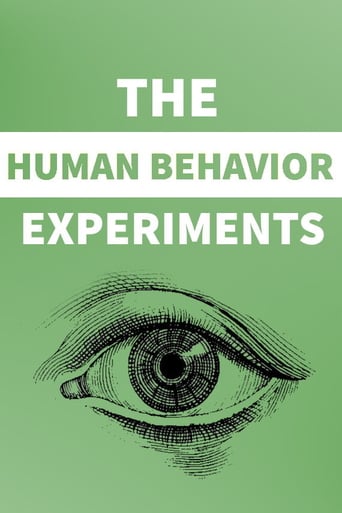triggerhappyguy
The subject matter of this documentary appealed to me. At college, and university, I studied all of the experiments mentioned. I was interested in finding out more information on the experiments. Perhaps that's where my problem with this documentary stems from, as I was left quite disappointed after watching it.The documentary presents the information in a watered down manner. I didn't expect there to be any jargon used, but I thought the coverage of each experiment could been more thorough. The documentary felt more like a sensationalized documentary, with dramatic re-enactments - grainy footage and all! One scene in particular had me chuckling; a man talking about dialling 911, with a cut back to re-enactment footage of a phone being dialled. Why? What did that add? I wish the information could have been delivered with a serious tone. Instead, it felt like one of the lesser "killer of the week" documentary shows on the Crime channel. Is that horror movie strings I hear in the soundtrack? Bleh.They interviewed very few experts, although it was nice to see a few of the original Psychologists involved with the original experiments. I just struggle to see how showing us a few minutes of some students talking about an experiment really adds to the viewer's enjoyment. It's almost like we were being told that "in case you don't get it... what happened was bad". Shouldn't it be up to the viewer to draw their own conclusions from the results of the experiments? The whole basis of the show was to present a series of infamous social experiments from the past, then ineptly linking said experiment to a more modern act of social horrors. I think there is merit in hypothesising the reasons behind behaviour we find puzzling, or shocking, and having these experiments to back up the argument. This documentary, however, failed at presenting a good juxtaposition between the experiments and similar occurrences that followed. The handling of the comparison felt clumsy, and I really think they glossed over a lot of interesting points.If you're going in to this documentary without much knowledge of the social behaviour experiments covered, I'd definitely recommend you give it a watch. If you're already familiar with some of the more notorious experiments, then you're not going to gain much from watching this.
youaresquishy
This is a pretty good film, about several experiments in the field of social psychology and several real-world stories that demonstrate the extent to which most humans will blindly obey authority figures, or, more generally, either fail to refrain from doing something bad or fail to help someone in trouble when they believe the responsibility is diffused amongst others. For the most part, it's pretty compelling stuff that really everyone should know about.However, the extent to which the psychologists interviewed in this film appear to blindly believe so firmly in the Kitty Genovese story as reported in The New York Times is somewhat reminiscent of the blind obedience to authority phenomenon criticized in the film. If you are interested in what really happened the night Kitty Genovese died, as opposed to the myth, take 9 minutes and listen: http://www.onthemedia.org/episodes/2009/03/27/segments/127346 (several people did call the police that night, probably only one or two of the alleged spectators actually had any idea what was happening other than that some woman was screaming, the number 38 appears to have basically been just made up by a journalist, etc.) The makers of this film would've done better to leave this particular story out of their otherwise very good film.
Charles Herold (cherold)
I think this documentary should be shown in every high school in the country, because it at least gives people the opportunity to be aware of, and thus able to guard against, the failings of human nature. The documentary does an excellent job of drawing parallels between classic psychological experiments and real life horrors like Abu Ghraib. These situations call into question how much responsibility we have for our actions; people do horrible things under the right circumstances, and someone in the movie says that people who will do the right thing are the exceptions rather than the rule, yet in the movie we see people whose behavior is both explainable and predictable according to these experiments who wound up doing jail time. It's a tricky question; can we hold people accountable for not being exceptional. (Of course, often, as in the case of Abu Ghraib, the responsibility falls on the people high up on the chain of command, who rarely have to pay for anything they do.) As a documentary, this movie comes across as what it is, a straightforward television documentary with a lot of talking heads and archival footage. The director has been more artful in his feature films, but with an intelligent approach to such a powerful, intriguing subject matter, artfulness is not required to make this riveting.
siderite
This movie is not a gem of documentary films, it's not fancy, pretty or spectacular, but the information contained in it is extremely well structured and very important. I would use this film to teach in high-school.Only 40 minutes long, the documentary focuses on the experiments undertaken by Milgran, Darley and Zimbardo, but also presents real cases that validate those experiments, including Abu Ghraib, the Kitty Genovese story and others. I highly recommend searching on Wikipedia about these experiments after you see the movie, as they were a lot more detailed and some had many variations.Bottom line: says the things that you don't want to believe are true, but they are, and that no one is willing to teach you, because they go against the ideas of blind obedience, peer pressure, etc. I would really like to see a sequel to this, maybe a mini series. A must see film.
